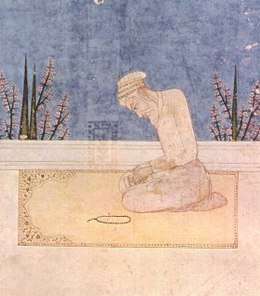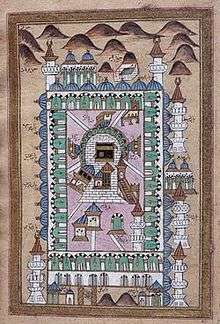Aqidah
Aqidah (Arabic: عقيدة, romanized: ʿaqīdah, plural عقائد ʿaqāʾid, also rendered ʿaqīda, aqeeda etc.) is an Islamic and term of Arabic origin that literally means "creed"[1] (Arabic pronunciation: [ʕɑˈqiːdæ, ʕɑˈqɑːʔɪd]).
| Part of a series on Islam Aqidah |
|---|
 |
|
Six articles of belief
|
|
Including: 1Al-Ahbash; Barelvis 2Deobandi 3Salafis (Ahl-i Hadith & Wahhabis) 4Sevener-Qarmatians, Assassins & Druzes 5Alawites, Qizilbash & Bektashism; 6Jahmīyya 7Ajardi, Azariqa, Bayhasiyya, Najdat & Sūfrī 8Nukkari; 9Bektashis & Qalandaris; Mevlevis, Süleymancıs & various Ṭarīqah 10Bahshamiyya, Bishriyya & Ikhshîdiyya |
| Part of a series on |
| Islam |
|---|
 |
|
Many schools of Islamic theology expressing different views on aqidah exist. Any religious belief system, or creed, can be considered an example of aqidah. However, this term has taken a significant technical usage in the Islamic theology, denoting those matters over which Muslims hold conviction. It is a branch of Islamic studies describing the beliefs of Islam.
Introduction
According to Muslim scholar Cyril Glasse, "systematic statements of belief became necessary, from early [on in the history of] Islam, initially to refute heresies, and later to distinguish points of view and to present them, as the divergences of schools of theology or opinion increased."[2]
The "first" creed written as "a short answer to the pressing heresies of the time" is known as Fiqh Akbar and ascribed to Abu Hanifa.[2][3] Two well known creeds were the Fiqh Akbar II[4] "representative" of the Ash'ari, and Fiqh Akbar III, "representative" of the Shafi'i.[2] Al-Ghazali also had an aqidah.[2] These creeds were more detailed than those described below.
Six articles of belief
The six articles of faith or belief (Arkan al-Iman) derived from the Quran and Sunnah,[5] are accepted by all Muslims. While there are differences between Shia and Sunni Islam and other different schools or sects concerning issues such as the attributes of God or about the purpose of angels, the six articles are not disputed.
The six Sunni articles of belief are:
- Belief in God and tawhid (monotheism)
- Belief in the angels
- Belief in the Islamic holy books[6]
- Belief in the prophets and messengers
- Belief in the Last Judgment and Resurrection
- Belief in predestination
The first five are based on several Qurʾanic creeds:
- ...righteous is he who believeth in God and the Last Day and the angels and the scripture and the prophets (2:177)
- ...believer believe in God and His angels and His scriptures and His messengers (2:285)
- Whoever disbelieveth in God and His angels and His scriptures and His messengers and the Last Day, he verily wandered far stray (4:136)
- Who is an enemy of God, His Angels, His Messengers, Gabriel and Michael! Then, lo! God is an enemy to the disbelievers (2:98)
The sixth point made it into the creed because of the first theological controversy in Islam. Although not connected with the Sunni-Shiʿi controversy about the succession, the majority of Twelver Shiʿites do not stress God's limitless power (qadar), but rather His boundless justice (ʿadl) as the sixth point of belief – this does not mean that Sunnis deny His justice, or Shiʿites negate His power, just that the emphasis is different.
In Sunni and Shia view, having Iman literally means having belief in the six articles.
Tawhid
| Part of a series on |
| God in Islam |
|---|
 |
|
List
|
|
|
Tawhid ("doctrine of Oneness") is the concept of monotheism in Islam. It is the religion's most fundamental concept and holds that God (Allah) is one (wāḥid) and unique (āḥad), and the only worthy of worship comparable to Jewish and Christian view on God, while worshipping something else is considered idolatry.
According to Islamic belief, Allah is the proper name of God, and humble submission to his will, divine ordinances and commandments is the pivot of the Muslim faith. "He is the only God, creator of the universe, and the judge of humankind." "He is unique (wāḥid) and inherently one (aḥad), all-merciful and omnipotent." The Qur'an declares "the reality of Allah, His inaccessible mystery, His 99 descriptive names expressing a quality characteristic, and His actions on behalf of His creatures.
Hadith of Gabriel
The Hadith of Gabriel includes the Five Pillars of Islam (Tawhid, Salat, Sawm, Zakat, Hajj) in answer to the question, "O messenger of God, what is Islam?" This hadith is sometimes called the "truly first and most fundamental creed."[2]
Salat

Salat is the practice of formal worship in Islam. Its importance for Muslims is indicated by its status as one of the Five Pillars of Islam, with a few dispensations for those for whom it would be difficult. People who find it physically difficult can perform Salat in a way suitable for them. To perform valid Salat, Muslims must be in a state of ritual purity, which is mainly achieved by ritual ablution, (wuḍūʾ), according to prescribed procedures.
Sawm
In the terminology of Islamic law, sawm means to abstain from eating, drinking (including water) and sexual intercourse from dawn until dusk. The observance of sawm during the holy month of Ramadan is one of the Five Pillars of Islam, but is not confined to that month.
Zakat
Zakat is the practice of charitable giving by Muslims based on accumulated wealth and is obligatory for all who are able to do so. It is considered to be a personal responsibility for Muslims to ease economic hardship for others and eliminate inequality.
Hajj

The Hajj is an Islamic pilgrimage to Mecca and the largest gathering of Muslims in the world every year. It is one of the five pillars of Islam, and a religious duty which must be carried out by every able-bodied Muslim who can afford to do so at least once in his or her lifetime.
Other tenets
| Part of a series on |
| Islam and Iman |
|---|
| Individuals |
| Groups |
|
| Terms |
|
In addition, some Muslims include Jihad and Dawah as part of aqidah
Jihad
Jihad (to struggle) and literally means to endeavor, strive, labor to apply oneself, to concentrate, to work hard, to accomplish. It could be used to refer to those who physically, mentally or economically serve in the way of God.[9]
Dawah
Da‘wah ("invitation") means the proselytizing or preaching of Islam. Da‘wah literally means "issuing a summon" or "making an invitation," being an active participle of a verb meaning variously "to summon" or "to invite." A Muslim who practices da‘wah, either as a religious worker or in a volunteer community effort, is called a dā‘ī (داعي plural du‘āh, gen: du‘āt دعاة).
A dā‘ī is thus a person who invites people to understand Islam through dialogue, not unlike the Islamic equivalent of a missionary inviting people to the faith, prayer and manner of Islamic life.
Eschatology
Eschatology is literally understood as the last things or ultimate things and in Muslim theology, eschatology refers to the end of this world and what will happen in the next world or hereafter. Eschatology covers the death of human beings, their souls after their bodily death, the total destruction of this world, the resurrection of human souls, the Last Judgment of human deeds by God after the resurrection, and the rewards and punishments for the believers and non-believers respectively. The places for the believers in the hereafter are known as Paradise and for the non-believers as Hell.
Schools of theology
Muslim theology is the theology and interpretation of creed (aqidah) that derived from the Qur'an and Hadith. The contents of Muslim theology can be divided into theology proper such as theodicy, eschatology, anthropology, apophatic theology, and comparative religion. In the history of Muslim theology, there have been theological schools among Muslims displaying both similarities and differences with each other in regard to beliefs.
Traditional Sunni schools
Kalām is "Islamic scholastic theology" of seeking theological principles through dialectic. In Arabic, the word literally means "speech/words." A scholar of kalām is referred to as a mutakallim (Muslim theologian; plural mutakallimūn). There are many schools of Kalam, the main ones being the Ash'ari and Maturidi schools in Sunni Islam. Traditionalist theology rejects the use of kalam, regarding humans reason as sinfull in religious matters.[10]
Asharism
Asharism accepts reason in regard of exegetical matters and traditionalistic ideas.[11] What God does or commands — as revealed in the Quran and ahadith — is by definition just. What He prohibits is by definition unjust.[17] Right and wrong are not objective realities.[12] The Quran is the uncreated word of God in essence, however it is created then it takes on a form in letters or sound.[13]
Maturidism
Maturidism holds, that humans are creatures endowed with reason, that differentiates them from animals. Further, The relationship between people and God differs from that of nature and God; humans are endowed with free-will, but due to God's sovereignty, God creates the acts the humans choose, so humans can perform them. Ethics can be understood just by reason and do not need prophetic guidances. Maturidi also considered hadiths as unreliable, when they are in odd with reason.[14] However, the human mind alone could not grasp the entire truth, thus it is in need of revelation in regard of mysterious affairs. Further, Maturidism opposes anthropomorphism and similtute, while simulaneously does not deny the divine attributes. They must be either interpreted in the light of Tauhid or be left out.[15]
Traditionalist theology
For the Traditionalist theology, the literal meaning of the Qur'an and especially the prophetic traditions have sole authority in matters of belief, as well as law, and to engage in rational disputation, even if one arrives at the truth, is absolutely forbidden.[16] Atharis engage in an amodal reading of the Qur'an, as opposed to one engaged in Ta'wil (metaphorical interpretation). They do not attempt to rationally conceptualize the meanings of the Qur'an and believe that the real meanings should be consigned to God alone (tafwid).[17] This theology was taken from exegesis of the Quran and statements of the early Muslims and later codified by a number of scholars including Ahmad ibn Hanbal and Ibn Qudamah.
Shiʿi beliefs and practices
Shiʿi Muslims hold that there are five articles of belief. Similar to the Sunnis, the Shiʿis do not believe in complete predestination, or complete free will. They believe that in human life there is both free will and predestination.
Twelver's Roots of Religion (Uṣūl ad-Dīn)
- Tawhid: The Oneness of God.
- Adalah: The Justice of God.
- Nubuwwah (Prophethood): God has appointed perfect and infallible prophets and messengers to teach mankind the religion (i.e. a perfect system on how to live in "peace.")
- Imamate: (Leadership): God has appointed specific leaders to lead and guide mankind — a prophet appoints a custodian of the religion before his demise.
- Last Judgment: God will raise mankind for Judgment
Ismaili beliefs
The branch of Islam known as Isma'ilism is the second largest Shiʿi community. They observe the following extra pillars:
- Belief in the Imamate
- Belief in the prophets and messengers
- Beliefs about the Last Judgment
Cross-sectarian
Literature pertaining to creed
Many Muslim scholars have attempted to explain Islamic creed in general, or specific aspects of aqidah. The following list contains some of the most well-known literature.
Sunni literature
- Mukhtasar Shu'ab al-Imān or "The 77 branches of faith" by the Imām al-Bayhaqi
- Al-Fiqh Al-Akbar by Imām Abu Hanifa
- al-ʿAqīdah aṭ-Ṭaḥāwiyya ("The Fundamentals of Islamic Creed by al-Tahawi). This has been accepted by almost all Sunnis (Atharis, Ash'aris and Maturidis). Several Islamic scholars have written about the Tahawiyya creed, including Ali al-Qari, al-Maydani, ibn Abi al-Izz and Abd al-Aziz ibn Baz.
- As- Sunnah by Imām Ahmad ibn Hanbal
- Al- Iman by al-Adni
- As-Sunnah by Imām Abu Dawood
- Sarihus Sunnah by Imām Al-Tabari
- As-Sunnah by Imām Al-Tabarani
- Aqīdah Salafi Ahl al-Hadith by al-Sabuni
- I'tīqad Ahl Al-Sunnah wal Jām'ah by Imām Lalqai Hibatullah
- As- Sunnah by Nasr al- Marwazi
- Ash-Shariah by al-Ajurri
- Al-Iman by Ibn Mandah
- Ad- Durrātu fīma yazibu i'tiqaduhu by Imām Ibn Hazm
- Kitāb at- Tāwhid by Imām Ibn Rajab
- Al- 'Aqīdah al-Nasafiyya by Imām Najm al-Din 'Umar al-Nasafi
- Ar-rīsālah al-kairoāniyah by Abi Zaid al-Kairoa
- Al-I'tīqad by Al-Bayhaqi
- Al-ʿAqīdah al-Wāsiṭiyyah ("The Wasit Creed") by ibn Taymiyyah.
- Sharh as Sunnah or the Explanation of the Sunna by al-Hasan ibn 'Ali al-Barbahari. Lists approximately 170 points pertaining to the fundamentals of aqidah.
- Khalq Afʿāl al-ʿIbād ("The Creation of the Acts of Servants") by Muhammad al-Bukhari. It shows the opinion of early scholars (Salaf) but it does not cover all topics.
- Lum'at al-Itiqād by ibn Qudamah. Details the creed of the early Imams of the Sunni Muslims and one of the key works in the Athari creed.
- al-ʿUluww by al-Dhahabī. Details the opinions of early scholars on matters of creed.
- Ibaanah ān ūsulid diyanah by Abu al-Hasan al-Ash'ari.
- Risālah al-Qudsiyyah ("The Jerusalem Tract") by al-Ghazali, where the rules of faith are discussed.
- Sa'd al-Din al-Taftazani on the creed of Abu Hafs Umar an-Nasafi
Shia literature
- Shiʿite Islam Muhammad Husayn Tabataba'i: translated by Hossein Nasr; (also reprinted under the title Shi'a.)"
- Root and Branches of Faith by Maqbul Hussein Rahim
- Shi'ism Doctrines, Thought and Spirituality by Hossein Nasr
Gallery
 Bosniak "Book of the Science of Conduct" lists 54 religious duties that each Muslim must know about, believe in, and fulfill. Published in 1831, the handbook is by the Bosnian author and poet Abdulwahāb Žepčewī.
Bosniak "Book of the Science of Conduct" lists 54 religious duties that each Muslim must know about, believe in, and fulfill. Published in 1831, the handbook is by the Bosnian author and poet Abdulwahāb Žepčewī. "Book of Wisdom" based on Islamic Theology by Khoja Akhmet Yassawi (died 1166)
"Book of Wisdom" based on Islamic Theology by Khoja Akhmet Yassawi (died 1166) “Safeguards of Transmission” by Ubayd Allāh ibn Masūd ibn Mahmud ibn Ahmad al-Mahbūbī (died 1346).
“Safeguards of Transmission” by Ubayd Allāh ibn Masūd ibn Mahmud ibn Ahmad al-Mahbūbī (died 1346).
See also
References
- Mohammad Taqi al-Modarresi (26 March 2016). The Laws of Islam (PDF). Enlight Press. ISBN 978-0994240989. Retrieved 22 December 2017. p. 470. From the root ʿ-q-d "to tie; knot", and hence the class VIII verb iʿtaqada "to firmly believe", verbal noun iʿtiqād "belief, faith, trust, confidence, conviction; creed, doctrine", participle muʿtaqad "creed, doctrine, dogma, conviction, belief, opinion". Wehr, Hans, “عقد” in: J. Milton Cowan (ed.), A Dictionary of Modern Written Arabic, 4th edition (1979).
- Glasse, Cyril (2001). New Encyclopedia of Islam (Revised ed.). Rowman & Littlefield Publishers. p. 105.
- Abu Hanifah An-Nu^man. "Al- Fiqh Al-Akbar" (PDF). aicp.org. Retrieved 14 March 2014.
- "Al-Fiqh Al-Akbar II With Commentary by Al-Ninowy". scribd.com.
- Joel Beversluis, ed. (2011). Sourcebook of the World's Religions: An Interfaith Guide to Religion and Spirituality. New World Library. pp. 68–9. ISBN 9781577313328.
- "The Quran". The Quran. contributors Iman Mohammad Kashi, Uwe Hideki Matzen, and Online Quran Project.CS1 maint: others (link)
- Farāhī, Majmū‘ah Tafāsīr, 2nd ed. (Faran Foundation, 1998), 347.
- Frederick M. Denny, An Introduction to Islam, 3rd ed., p. 405
- Khalid Mahmood Shaikh
- Hadi Enayat Islam and Secularism in Post-Colonial Thought: A Cartography of Asadian Genealogies Springer, 30.06.2017 ISBN 9783319526119 p.48
- Ed. Esposito The Oxford History of Islam Oxford University Press 1999 ISBN 9780195107999 p. 280
- Brown, Jonathan A.C. (2014) Misquoting Muhammad: The Challenge and Choices of Interpreting the Prophet's Legacy. Oneworld Publications ISBN 978-1780744209 p. 53
- Cyril Glassé, Huston Smith The New Encyclopedia of Islam Rowman Altamira 2003 ISBN 978-0-759-10190-6 page 62-3
- Rico Isaacs, Alessandro Frigerio Theorizing Central Asian Politics: The State, Ideology and Power Springer, 2018 ISBN 9783319973555 p. 108
- Mohammad Sharif Khan, Mohammad Anwar Saleem Muslim Philosophy and Philosophers PH Publishing, 1994 ISBN 9788170246237 p. 30
- Jeffry R. Halverson, Theology and Creed in Sunni Islam. ISBN 0230106587, p 36.
- Jeffry R. Halverson, Theology and Creed in Sunni Islam. ISBN 0230106587, p 36-37.
- Nader El-Bizri, ‘God: essence and attributes’, in The Cambridge Companion to Classical Islamic theology, ed. Tim Winter (Cambridge: Cambridge University Press, 2008), pp. 121-140
